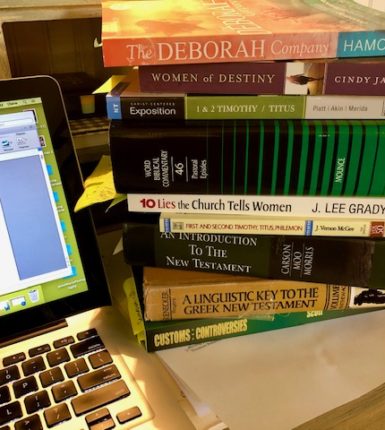“The Lord gives the command [word]; the women who proclaim the good tidings are a great host.” (Ps. 68:11, NASB)
God has no intention of excluding His daughters as He orchestrates His plans for the world.
Anyone with a spiritual heartbeat can feel the pulse of coming revival and the harvest of the nations. And in order to make this happen, God is raising up an army of kingdom proportions. (See Joel 2:1-11.)
It’s interesting that Joel 2 contains the oft quoted verses found in Acts 2:17-21, in which we see an important progression of Holy Spirit activity that includes women encountering God and being used by Him for a great harvest:
And it shall come to pass in the last days… that I will pour out of My Spirit on all flesh; your sons and your daughters shall prophesy, your young men shall see visions, your old men shall dream dreams. And on My menservants and on My maidservants I will pour out My Spirit in those days; and they shall prophesy. I will show wonders in heaven…. before the coming of the great and awesome day of the Lord. And it shall come to pass that whoever calls on the name of the Lord shall be saved. (New King James Version; emphasis added)
What’s Up With Deborah?
I sometimes wonder if the presence of women in this passage is repeated in case we missed it! Regardless, we have to look at the whole of scripture when we discuss the role of women in life and ministry within the body of Christ.
The fact that Deborah served in a position of authority as judge over Israel is very compelling. (1) Perhaps God, in His all-knowingness, understood there would later be confusion about this, even under the new covenant.
We must remember that the revelation of scripture is always progressive, and that Christ died to move us forward—not propel us backward. We are the spiritual children of Abraham under a new and better covenant, so if Christ—in the Old Testament—saw fit to appoint a woman into such a position of prominence and authority, that ought to capture our attention. (2)
A Shotgun Blast
I grew up in a church environment in which women only served in minor roles of authority at such times when there was no man available. Even if an unqualified man with no gifting or ability volunteered, he would serve over a woman who was qualified. I don’t question their motives—they meant well—but they lacked revelation.
So what to do, then, with those pesky New Testament passages that come back time and again to trouble us? Space does not allow for thorough teaching, but perhaps the brief “shotgun” approach that follows can open the door for new thought processes.
First, taking scripture literally is a very good thing, as long as one keeps the broader picture in mind. Even the New Testament cannot be taken literally in every instance, or we would be walking around without hands and eyes! (3)
Rather, what we want to be careful of is to not brush off parts of scripture and dismiss them as not applicable to our current day just because they do not suit us. Basic hermeneutical rules apply—as mentioned, we have to see what the rest of the Bible says on the particular subject that a passage is addressing, and we must keep in mind that not all scripture is intended for formulating doctrine.
Let’s land on 1 Corinthians 14:34, which references a law that says women must be silent. There is, in fact, no Old Testament law or scripture that says this; it is likely a reference to a Jewish rabbinical tradition, as women (and children) were treated and regarded much like slaves in both Old and New Testament cultures. Within this culture most women were completely uneducated, which would further prohibit their ability to speak up.
We already saw from Acts 2 that women are to receive the outpouring of the Holy Spirit, which includes prophecy. And Paul himself acknowledged that women can prophesy. (4)
There are also indications that this passage could be specifically addressed to a group of women in the church in Corinth who were causing chaos and disorder by the manner in which they were continually speaking up.
As well, it is possible that Paul might actually have been quoting a section of a letter previously mailed to him (perhaps even sarcastically), as most of the specific issues addressed in 1 Corinthians are topics from earlier correspondence related to this church. (5)
Scripture mentions women who were associated with Paul in apostolic ministry (6; see NKJV—some translations have removed the female association). This brings up another related issue—that of translation. Regardless of the canonization of scripture, we must acknowledge that the human element adds another layer of complexity to the issue of women within the church.
Closing Thoughts
My husband is my biggest cheerleader and supporter because he understands the principle of glorification. Remember when Jesus said in John 17:1, “Father… glorify Your Son, that Your Son also may glorify You”? My husband understands that as he releases me—and honors, respects and lifts me up in the Lord—he himself is exalted.
Men, you are not in competition with women in life and ministry, nor are husbands in competition with their wives. Rather, as fellow members of the body, we are all lifted to a higher level in Christ when we embrace the gifts in each other.
I challenge you to release your women into their full and complete destiny in the Lord. The army of God is on the move and about to significantly advance—and we will not take the kingdom with half an army. Let’s welcome that great company of women into the ranks, and watch what God will do!
Endnotes
[1] See Judges 4, 5
[2] Gal. 3:28, 29; Heb. 8-10; John 5:39
[3] See Matt. 5:29, 30
[4] See 1 Cor. 11:5
[5] See 1 Cor. 7:1
[6] See Rom. 16:1, 3, 7
Suggested Reading
1. 10 Lies the Church Tells Women, by J. Lee Grady
2. Women of Destiny, by Cindy Jacobs
Posted on Generals International.
Posted on The Elijah List.
Posted on Spirit Fuel.
Posted on Charisma Magazine SpiritLed Woman.

Diane is a writer, speaker and minister ordained with both Christian International and Generals International. Her articles are regularly featured on The Elijah List, as well as platforms like Charisma Magazine, Charisma News, Intercessors For America and others. She and her husband, Allen, co-founded Starfire Ministries with a vision to see the kingdom established beyond the four walls of the traditional church. They host a podcast with Charisma Podcast Network, and serve as Church Mountain, Regional, and Montana Coordinators for the Reformation Prayer Network, and as Media Mountain Leader/Facilitators for C.I.’s Culture Influencers.












